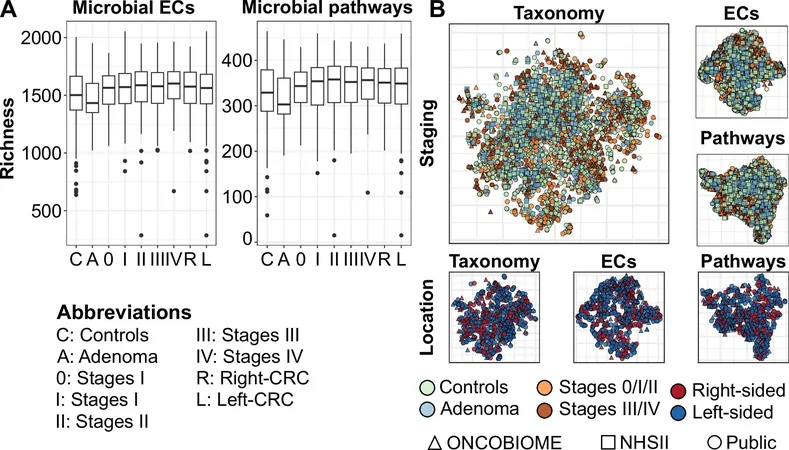
Revolutionary Discovery: AI and Gut Bacteria Pave the Way for Early Colorectal Cancer Detection!
2025-06-03
Author: Rajesh
Game-Changer in Colorectal Cancer Screening
Imagine a world where a simple stool test could save lives from colorectal cancer—no more invasive colonoscopies! Researchers are making strides in utilizing the gut microbiome as a diagnostic tool for early detection of this dangerous disease.
International Study Unveils Microbial Signature
An exciting new study published in *Nature Medicine* and led by the University of Trento reveals that a specific group of gut bacteria, dubbed the "microbial signature," is significantly more prevalent in colorectal cancer patients. Among the dozen identified bacteria are the notorious *Fusobacterium nucleatum*, but lesser-known bacteria like *Parvimonas micra* and *Gemella morbillorum* are also standing out.
Bacteria’s Role in the Tumor Microenvironment
Nicola Segata, the project lead, states that these bacteria, typically found in healthy mouths, appear to thrive in the tumor microenvironment of colorectal cancer patients. "Their presence in stool samples is almost exclusive to those with the disease," Segata explains.
Near-Perfect Accuracy: A New Hope
With this microbial signature, researchers could develop noninvasive screening methods with an accuracy nearing 90%. This groundbreaking approach not only aims to detect cancer early but may also correlate with the disease's severity and location, offering insights into progression.
Harnessing the Power of Machine Learning
Thanks to cutting-edge machine learning techniques, the team now has a predictive model capable of indicating the likelihood of colorectal cancer in individuals. Segata highlights how this technology enhances their metagenomic analysis, marking a significant leap forward in cancer diagnostics.
Crucial Questions and Future Trials
While the study establishes a promising foundation, researchers are still probing whether specific bacteria contribute to cancer development. "Ultimately, our focus is on creating an effective, noninvasive screening tool for the general public," emphasizes Gianmarco Piccinno.
Understanding the Microbiome's Cancer Link
For years, scientists have acknowledged that certain gut bacteria can disrupt cellular biology and potentially lead to cancer. Given that colorectal cancer is the third most common and the second deadliest globally—with 40% of patients diagnosed only after metastasis—this research is more urgent than ever.
A Collaborative Effort Against Cancer
The investigators, including the powerhouse collaboration from the multidisciplinary PROSPECT team, are also looking into how the microbiome affects cancer treatment, especially in immunotherapy. Their work is especially critical as colorectal cancer rates rise in younger adults, prompting further investigation.
What’s Next?
As the scientific community delves deeper, unanswered questions remain about the microbiome's role in cancer. This innovative study sets the stage for future research that could change how we detect and treat one of the most insidious diseases of our time. Get ready, world—your gut may hold the keys to a cancer-free future!


 Brasil (PT)
Brasil (PT)
 Canada (EN)
Canada (EN)
 Chile (ES)
Chile (ES)
 Česko (CS)
Česko (CS)
 대한민국 (KO)
대한민국 (KO)
 España (ES)
España (ES)
 France (FR)
France (FR)
 Hong Kong (EN)
Hong Kong (EN)
 Italia (IT)
Italia (IT)
 日本 (JA)
日本 (JA)
 Magyarország (HU)
Magyarország (HU)
 Norge (NO)
Norge (NO)
 Polska (PL)
Polska (PL)
 Schweiz (DE)
Schweiz (DE)
 Singapore (EN)
Singapore (EN)
 Sverige (SV)
Sverige (SV)
 Suomi (FI)
Suomi (FI)
 Türkiye (TR)
Türkiye (TR)
 الإمارات العربية المتحدة (AR)
الإمارات العربية المتحدة (AR)